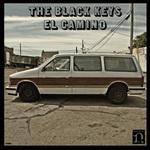
The Black Keys El Camino
(Nonesuch)
The lure of Nashville, Tennessee can be overwhelming for a certain kind of musician seeking a degree of authenticity to provide creative solace. Robert Plant went there and found his muse in Alison Krauss, for 2007’s wonderful Raising Sand. Kings of Leon formed there, Jack White moved there, and of course it’s the home of Country & Western. The latest band of Nashville decampers in search of a bit of honest-to-goodness are The Black Keys, originally of Akron, Ohio.
El Camino, their seventh album, features the kind of raw, dirty, bluesy rock’n’roll that Kings of Leon and White Stripes have claimed as their own over the last decade or so. Things get off to a swinging start with the album’s single, Lonely Boy, featuring a loose and low-down guitar riff you can imagine Jimmy Page conjuring back in the day. It’s a cool, catchy number that has genuine funk in its bloodstream. A good start. The swagger continues on Run Right Back, a track that starts with some nice slide guitar, and a louche groove. As the track goes on something starts to niggle in the brain. Little Black Submarines starts off acoustically, if somewhat unremarkably. Then the track explodes into full rock mode, bringing to mind Zeppelin again, but a rather turgid version, as if the bounce and groove had been surgically removed. The doubts begin to grow. Most, if not all of the tracks here feature the kind of guitar playing, vocals and lyrics that early 70s rock pioneers like Zep, Sabbath, the Stones, even Bad Company, created the blueprints for. The Black Keys understand the history of rock’n’roll, but they are too in thrall to its legacy to really offer anything new or genuinely exciting. The album is not without merit, the aforementioned Lonely Boy being a particular highlight. Hell Of A Season offers more swing than swagger and is better for it, and Stop Stop and Nova Baby nod their groovy heads further back in time to 1960s soul and R’n’B. But the album is effectively a tick-list of influences, bands and musical styles.
My dilemma is this: half of me really likes this album. I can dig its grooves, I can nod my head in recognition of its influences and forebears, I can appreciate the skill with which The Keys create their love-letter to rock’s glorious past. But the other half of me hates it and everything it stands for. This isn’t rock’n’roll. It’s a pastiche, a simulacrum of rock’n’roll. The Black Keys have created a record that they believe is how a rock’n’roll record should sound, but without soul or sex or genuine sweet emotion. It will doubtless have many fans, as The Keys’ moment in the spotlight seems to be approaching. It will be picked up by cool kids hankering after a new White Stripes, and the glossy monthlies will love it. But for those of us who are as passionate about the future of rock’n’roll as we are about its past, it’s just a little bit depressing.
2 December, 2011 - 11:01 — David John Wood